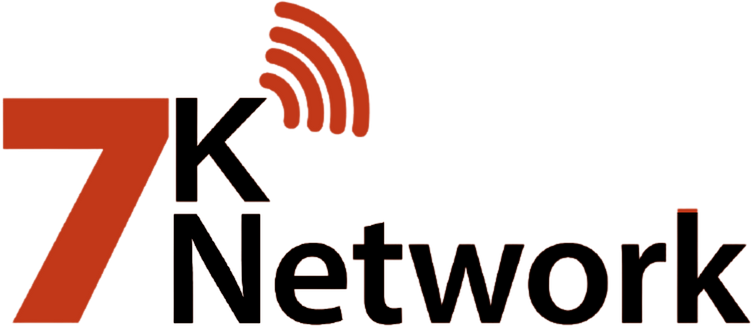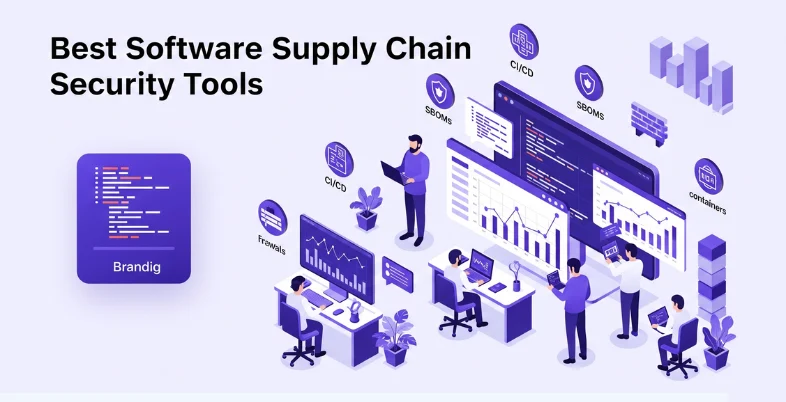Modern software is built with more than just your own code; it relies on open-source libraries, containers, CI/CD tools, and external dependencies. Development is accelerated, but there are unintended consequences as well. One vulnerable component or compromised tool can expose your entire application to attack.
Because of this, protecting your software supply chain is now essential. From dependency scanning to CI/CD pipeline protection, the right tools can help you lock down every part of your development process.
In this blog, we’ll cover 15 of the best software supply chain security tools in 2025. Whether you’re running a fast-moving startup or a large-scale engineering team, these solutions are designed to help you build and ship software with confidence.
What Is Software Supply Chain Security?
Software supply chain security refers to the set of tools and practices used to safeguard the software development lifecycle from tampering, vulnerabilities, or misuse, especially via third-party components.
The modern development workflow involves:
- Open-source libraries
- DevOps automation tools
- Containers and registries
- Cloud-native CI/CD pipelines
Every element is a potential attack surface. Threats include:
- Dependency confusion attacks
- Malicious package uploads (e.g., on npm or PyPI)
- Compromised build environments
- Unsigned or unverifiable binaries
SSCS tools offer solutions like SBOM generation, code signing, policy-as-code, and vulnerability monitoring to provide end-to-end security and visibility.
Quick Comparison Table
| Tool | Best For | Key Features |
| Snyk | Open-source & container security | Dependency scanning, SBOM, IaC, CI/CD support |
| Chainguard | Secure container images | Hardened images, provenance, Sigstore |
| Phylum | NPM security | Malicious package detection, behavior modeling |
| Slim.AI | Container hardening | Image slimming, SBOM, scanning |
| Anchore | SBOM + policy enforcement | SBOM, CVE scan, FedRAMP support |
| JFrog Xray | Artifact scanning | Deep repo scans, CI/CD integration |
| Sonatype Nexus Lifecycle | OSS governance | License & policy enforcement, vulnerability scan |
| Veracode | Enterprise application security | Static analysis, pipeline integrations |
| ReversingLabs | Binary integrity | Malware detection, binary analysis |
| Dependency-Track | OSS CVE monitoring | Real-time SBOM, community-driven |
| Sigstore | Code signing & provenance | Keyless signing, transparency logs |
| Fortify | Static + SCA | SAST, supply chain protection |
| Microsoft Defender for DevOps | Azure/GitHub CI/CD | Dependency scan, alerting, policy integration |
| FOSSA | License compliance | SBOM, OSS license tracking |
| TrustSource | SPDX + CVE tracking | License clearance, vulnerability alerts |
Also Read: Malware Removal Tools
Best Software Supply Chain Security Tools
1. Snyk
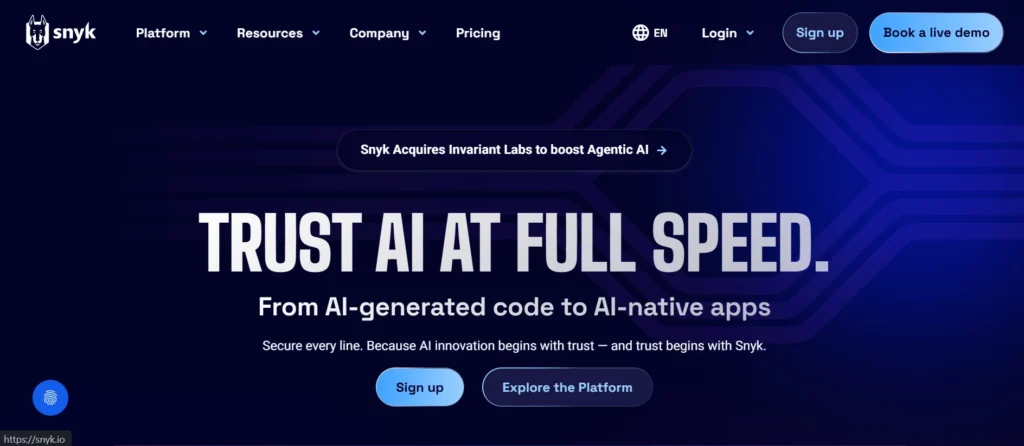
Website: https://snyk.io
Snyk is a developer-first software supply chain security tool that helps identify and fix vulnerabilities in code, dependencies, containers, and infrastructure as code. It integrates directly into development workflows like GitHub, GitLab, and Bitbucket, allowing teams to catch issues early. Snyk supports automated scanning and remediation, including pull requests for fixes. It also generates SBOMs in SPDX and CycloneDX formats and provides real-time monitoring for newly discovered CVEs. Its user-friendly dashboard and proactive security approach make it popular among DevSecOps teams.
Features:
- Scans open-source libraries and containers for CVEs
- SBOM generation in SPDX and CycloneDX formats
- Auto-remediation with PRs in Git
- CI/CD integration with Jenkins, GitHub Actions, CircleCI
- Real-time security monitoring and alerts
Pricing:
- Free Plan – $0/month
- Team Plan – $25/month per contributing developer (min. 5 users)
- Enterprise Plan – Custom pricing (contact sales)
2. Anchore Enterprise
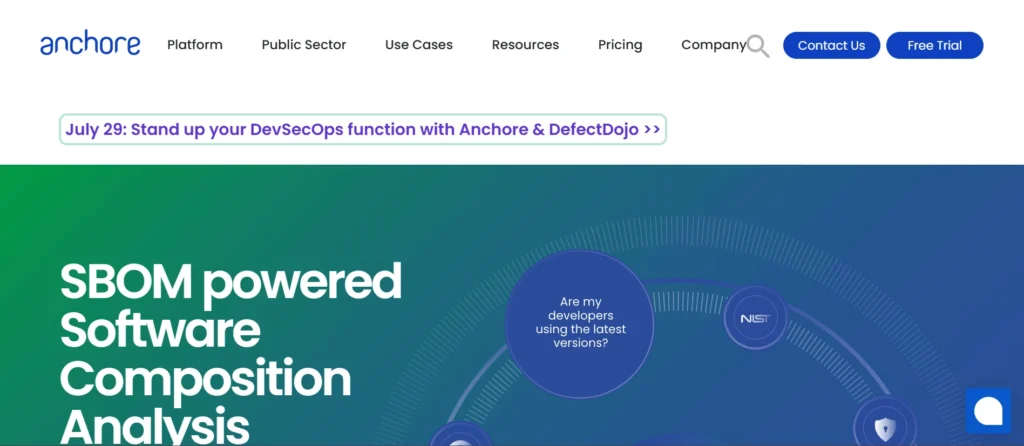
Website: https://anchore.com
Anchore stands out among leading Software Supply Chain Security Tools by offering comprehensive container security and SBOM management, tailored for enterprises using Kubernetes and Docker. It enables image scanning, vulnerability detection, and policy enforcement across CI/CD pipelines. Anchore provides full SBOM support through its popular open-source tools, Syft and Grype, both widely adopted in the developer community. Its enterprise edition allows teams to enforce strict compliance policies and operate securely in air-gapped or highly regulated environments, making it ideal for government, defense, and financial sectors.
Features:
- Container vulnerability scanning
- SBOM generation using Syft
- Vulnerability scanning via Grype
- Supports compliance policies (FedRAMP, DoD, etc.)
- CLI and API access for custom integration
Pricing:
- Available on request
3. JFrog Xray
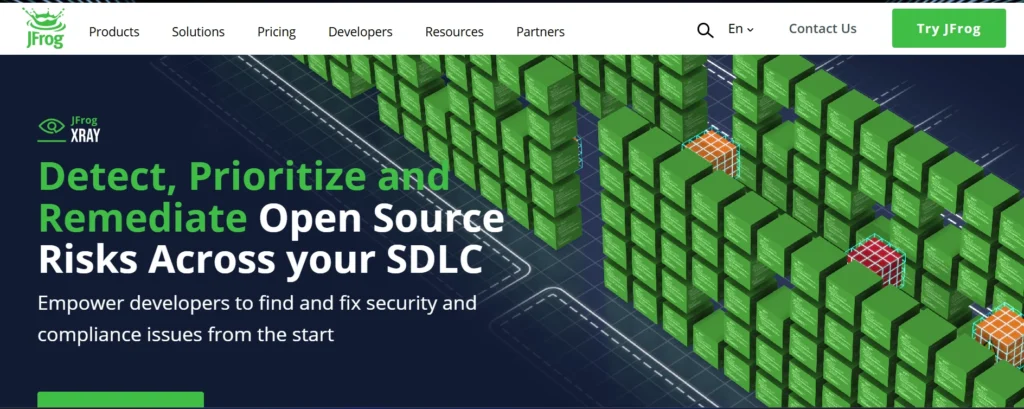
Website: https://jfrog.com/xray
JFrog Xray is a software composition analysis (SCA) tool integrated with the JFrog Artifactory ecosystem. It scans artifacts and container images for vulnerabilities, license compliance, and operational risks. Xray supports continuous scanning from the development stage to production, helping teams identify threats before deployment. It integrates with CI/CD pipelines and DevOps workflows to provide real-time feedback. Xray is known for deep recursive scanning and native support for a wide range of package types. It aligns with enterprise-grade SBOM and compliance needs.
Features:
- Deep recursive scanning of binaries and containers
- CVE detection and severity scoring
- SBOM generation with artifact context
- Native integration with Artifactory and CI tools
- Supports policy enforcement and license governance
Pricing:
- Available on request
4. Chainguard Enforce
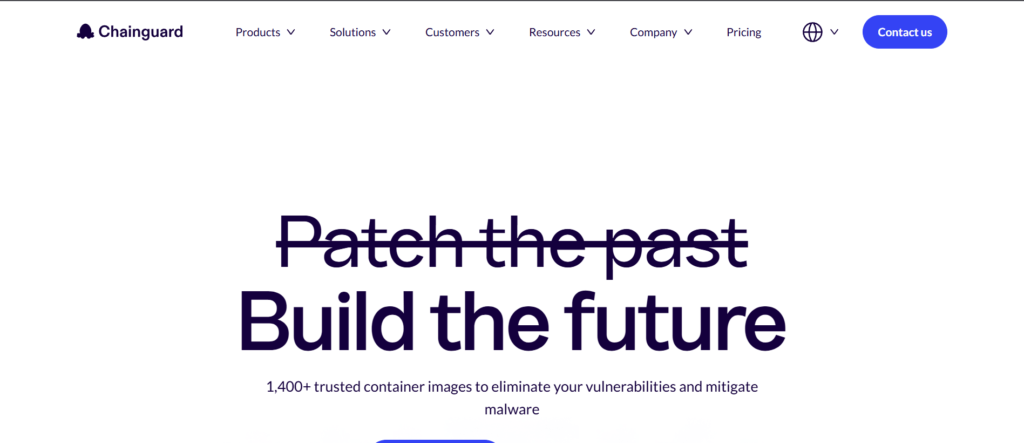
Website: https://www.chainguard.dev
Chainguard Enforce is a security platform built to enforce SLSA (Supply-chain Levels for Software Artifacts) compliance across container images and CI/CD pipelines. It automates SBOM generation, signing, verification, and vulnerability detection in software artifacts. Enforce detects tampering or unauthorized changes in order to secure the build process itself. The platform is trusted for hardened container images and focuses on immutability, reproducibility, and provenance. Container registries and Kubernetes can be tightly integrated with Chainguard.
Features:
- Enforces SLSA-compliant builds
- Automated SBOM creation and attestation
- Signature verification and tamper protection
- Hardened container base images
- Real-time visibility into image provenance
Pricing:
- A free quote is available for select plans.
Find the Best AI Tools for Cybersecurity
5. Google Binary Authorization
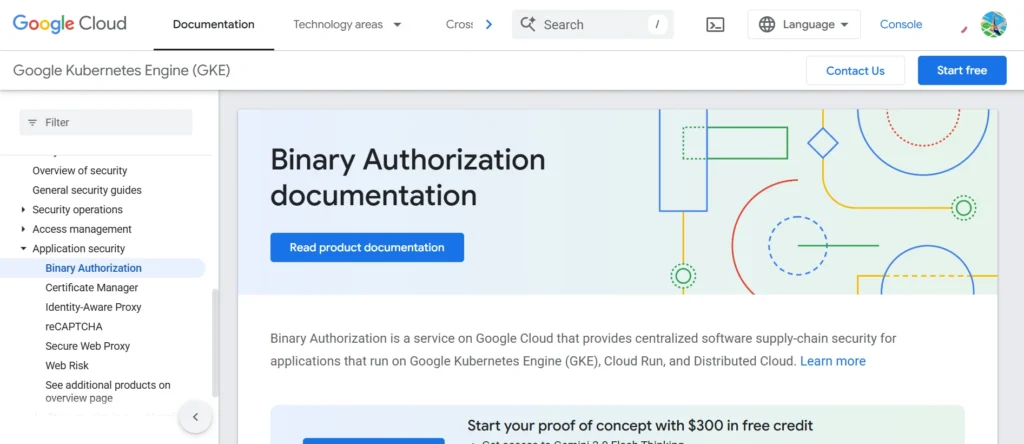
Website: https://cloud.google.com/binary-authorization
Only verified, signed containers are deployed thanks to Google Binary Authorization, a security feature for Google Kubernetes Engine (GKE) and Artifact Registry. It allows DevSecOps teams to create policies that enforce signature validation and provenance checks before software runs in production. Binary Authorization helps prevent the execution of untrusted code, reducing the risk of supply chain attacks. It’s tightly integrated with Google Cloud services and supports SLSA and other secure software frameworks.
Features:
- Signature verification for container images
- Policy enforcement for GKE and Cloud Run
- Integration with Cloud Build and Artifact Registry
- Support for SLSA attestation and provenance
- Protects production workloads from untrusted artifacts
Pricing:
- Included with GKE Standard and Autopilot pricing
6. Sonatype Nexus Lifecycle
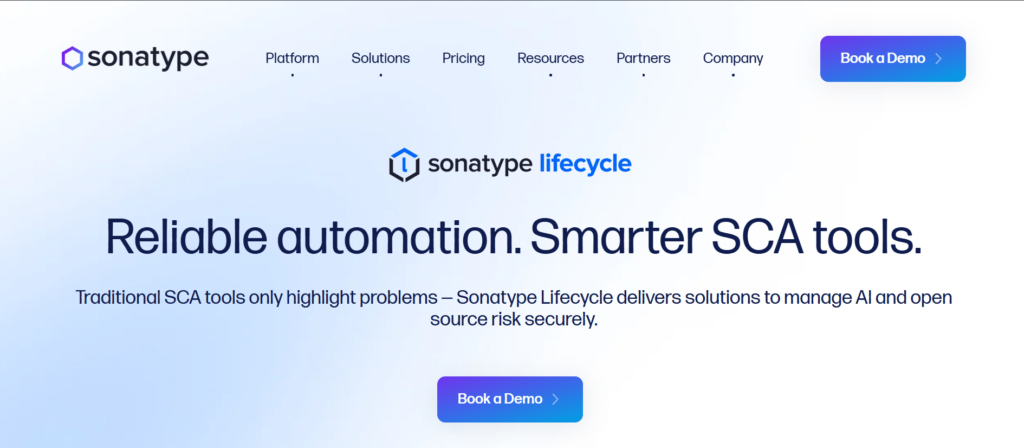
Website: https://www.sonatype.com/product-nexus-lifecycle
Sonatype Nexus Lifecycle secures the entire software development lifecycle by identifying and remediating vulnerabilities in open-source components. It integrates directly with popular build tools and CI/CD platforms to enforce policies on code quality, licensing, and security. Nexus Lifecycle also generates detailed SBOMs and offers insights into component health. Trusted by enterprises worldwide, it automates governance and risk mitigation in real-time across large-scale development environments.
Features:
- Vulnerability scanning for open-source dependencies
- Automated policy enforcement and remediation
- Continuous monitoring of component health
- SBOM generation and license risk analysis
- Integrates with Maven, Gradle, Jenkins, and more
Pricing:
- Nexus Repository Pro – $960/month (billed annually)
- Sonatype Lifecycle – $57.50/user/month (billed annually)
- Sonatype Firewall – $18.67/user/month (billed annually)
- Sonatype SBOM Manager – Custom pricing (limited-time offer; contact sales)
7. ReversingLabs Software Supply Chain Security
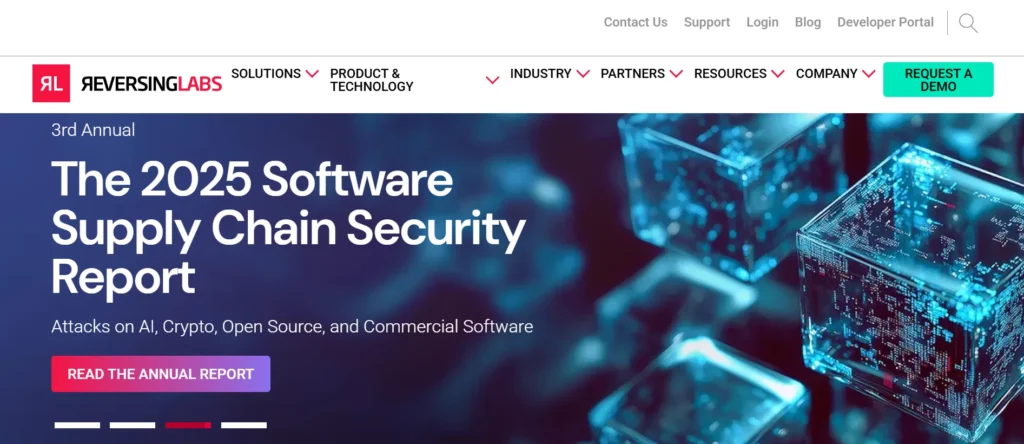
Website: https://www.reversinglabs.com
ReversingLabs provides advanced software supply chain security solutions focused on malware detection, binary analysis, and package integrity. Their platform scans software packages and binaries to identify hidden threats, tampered artifacts, and supply chain compromises. It supports source code integrity validation and threat scoring. The platform is often used by enterprises and software publishers that distribute third-party binaries and want to ensure complete trust and transparency in software delivery.
Features:
- Binary software integrity validation
- Threat scoring and malware detection
- Tamper detection in packages and containers
- Integration with build systems and registries
- Detailed SBOM and metadata insights
Pricing:
- Available on request
8. ActiveState Platform
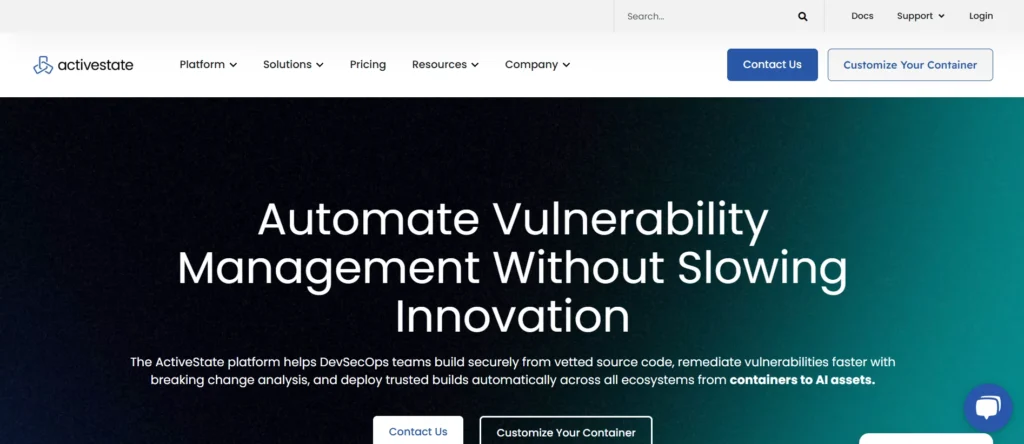
Website: https://www.activestate.com
ActiveState Platform helps teams build secure, reproducible, and dependency-locked open-source language runtimes such as Python and Perl. It enables centralized control over the packages and their versions being used in development and production. The platform verifies package integrity and automatically rebuilds components from source, helping eliminate tampering and version drift. ActiveState is well-suited for organizations looking to improve their open-source software provenance and governance.
Features:
- Custom, dependency-locked runtime creation
- Verifies the integrity of all dependencies
- Rebuilds open-source packages from source
- SBOM creation for each build
- Policy controls over package use and versions
Pricing:
- Available on Contact
9. FOSSA
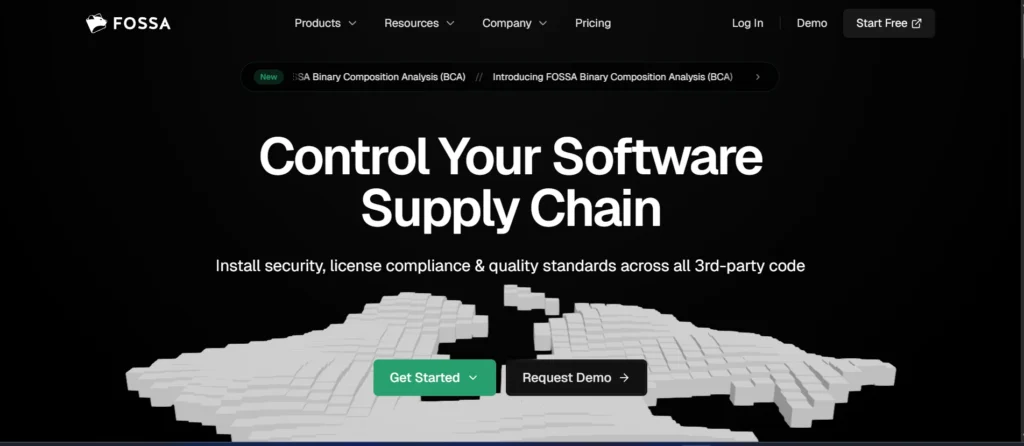
Website: https://fossa.com
FOSSA is one of the leading Software Supply Chain Security Tools, automating open-source management by tracking dependencies, generating SBOMs, and ensuring license and security compliance throughout the development pipeline. It provides real-time scanning for vulnerabilities and legal risks in every build, integrating seamlessly with GitHub, GitLab, Bitbucket, and major CI/CD systems. FOSSA also supports policy enforcement and alerts teams early about risky components, making it a popular choice for enterprises aiming to automate open-source risk management at scale.
Features:
- Real-time vulnerability detection
- License compliance tracking
- Automated SBOM generation
- CI/CD integration with build pipelines
- Custom policy management and risk reports
Pricing:
- Free plan
- Business: $20
- Enterprise: Custom
10. StackHawk
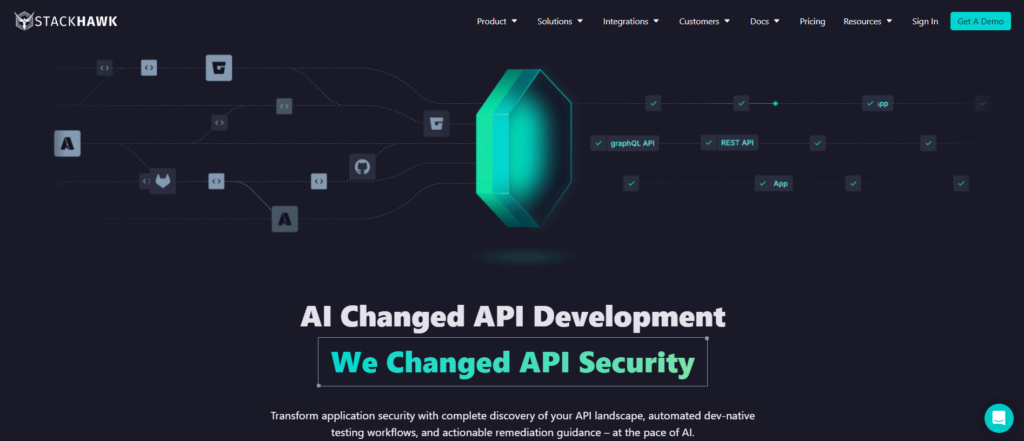
Website: https://www.stackhawk.com
StackHawk is a dynamic application security testing (DAST) platform built for developers. While not traditionally a supply chain tool, StackHawk plays a crucial role in securing APIs and applications as part of a modern DevSecOps pipeline. It integrates into CI/CD workflows, scanning live applications for vulnerabilities during build or deployment. StackHawk helps teams catch exploitable issues before code hits production, reducing risk at the application layer in the supply chain.
Features:
- Automated API and application vulnerability scanning
- CI/CD integration for pre-production testing
- Customizable testing rules and alerts
- Dev-first usability and GitHub integration
- Supports OpenAPI, GraphQL, SOAP
Pricing:
- Vibe – Coming Soon
- Pro – $49/month
- Enterprise – $59/month
- Custom – Contact Sales
11. Aqua Trivy
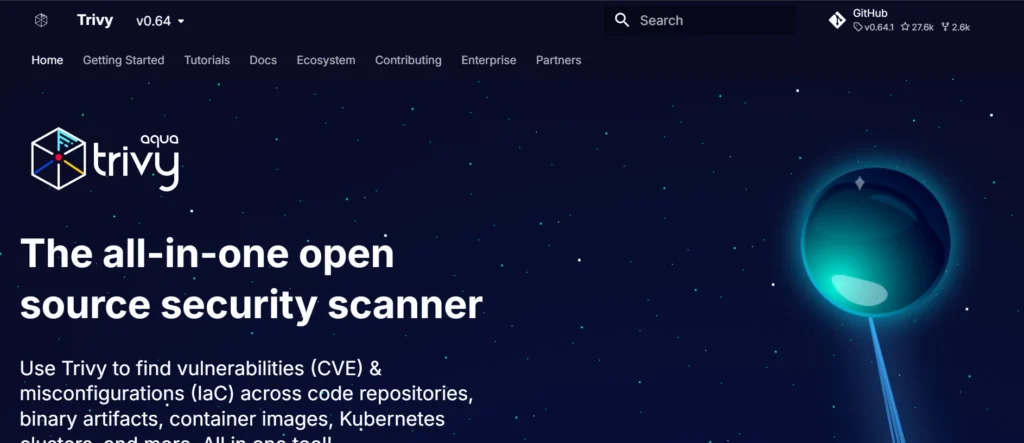
Website: https://aquasecurity.github.io/trivy
Trivy is an open-source vulnerability and misconfiguration scanner developed by Aqua Security. It supports scanning container images, Git repositories, and IaC templates. Trivy offers real-time CVE detection, license checks, and SBOM generation. It’s widely adopted by DevOps teams because of its simplicity and fast scanning capabilities. Trivy supports output formats like CycloneDX and SPDX for SBOM exports and integrates easily into CI/CD pipelines.
Features:
- CVE scanning for containers and repositories
- SBOM generation (CycloneDX/SPDX)
- License compliance checks
- CI/CD and GitOps integration
- Infrastructure-as-code (IaC) misconfiguration detection
Pricing:
- Free and open-source
12. OSS Review Toolkit (ORT)
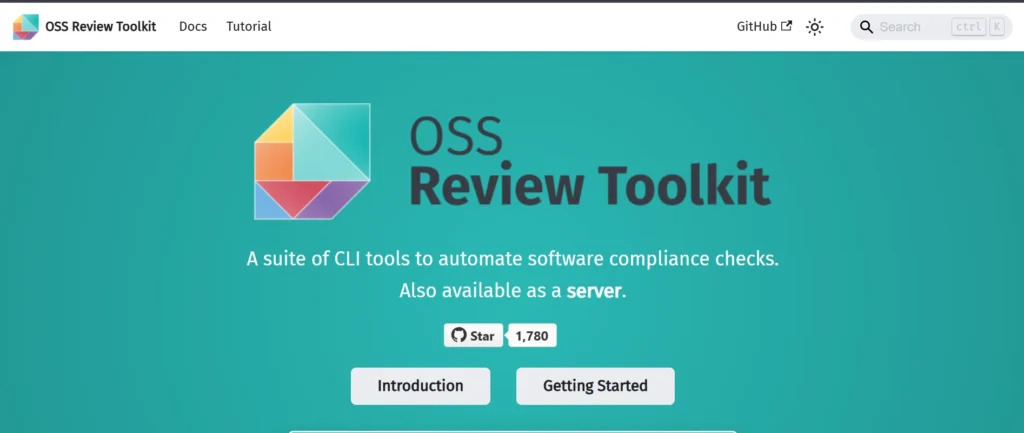
Website: https://oss-review-toolkit.org
ORT is an open-source toolchain designed to identify license, security, and policy compliance issues in open-source software dependencies. It helps organizations scan, analyze, and verify dependencies across different ecosystems. ORT integrates with scanners like Scanner and Analyzer, while also producing structured SBOMs and automated compliance documentation. It’s maintained by the open-source community and is ideal for teams that want transparency and control without vendor lock-in.
Features:
- Dependency scanning across multiple ecosystems
- License and security compliance detection
- SBOM generation and reporting
- Flexible configuration for policies and rules
- Integrates with other scanners and build tools
Pricing:
- Free and open-source
13. GitGuardian Public Monitoring
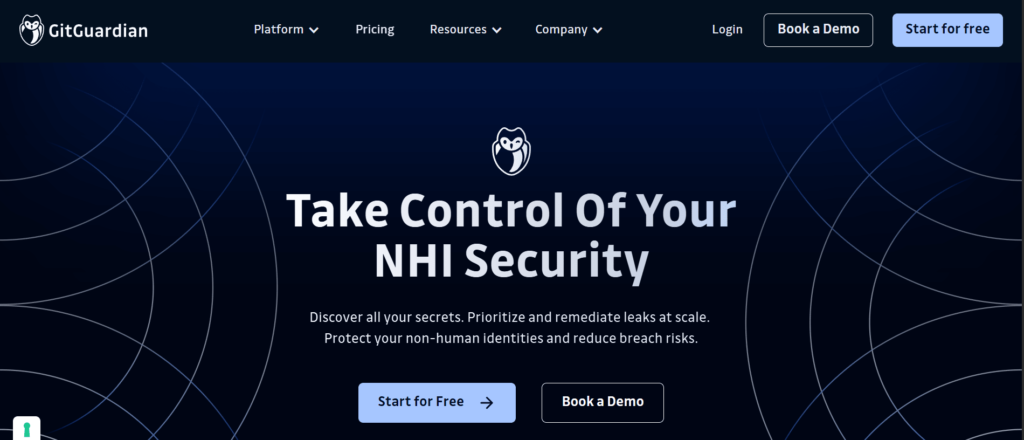
Website: https://www.gitguardian.com
GitGuardian keeps an eye out for sensitive data leaks, including credentials, secrets, and API tokens, in public GitHub repositories. While not a traditional supply chain scanner, it plays a critical role in protecting the integrity of software by ensuring that confidential data isn’t unintentionally exposed in the codebase. Developers and security teams widely use it to mitigate secret sprawl, a common vector in supply chain attacks.
Features:
- Real-time monitoring of public GitHub activity
- Alerts for exposed secrets, keys, and credentials
- Dashboard for incident tracking and remediation
- Team collaboration and audit trails
- Integration with Slack, Jira, GitHub
Pricing:
- Free – $0/month
- Business – Contact Sales
- Enterprise – Contact Sales
14. Pyrsia by JFrog
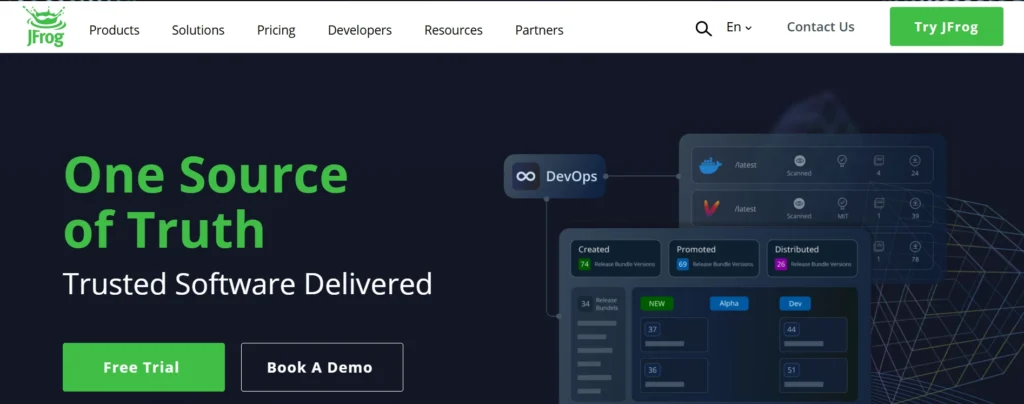
Website: https://jfrog.com/pyrsia
Pyrsia is a decentralized, open-source network that plays a growing role among modern Software Supply Chain Security Tools. It ensures the security and integrity of software dependencies by leveraging blockchain to create a verifiable chain of trust. Pyrsia helps prevent tampering and dependency hijacking, offering a transparent and tamper-proof delivery mechanism for open-source components. Though still in early development, it’s gaining traction as a next-gen tool for securing the software supply chain.
Features:
- Blockchain-based package verification
- Decentralized trust for software components
- Prevents package poisoning and dependency confusion
- Open source and community-driven
- Integrated with container registries and build tools
Pricing:
- Free and open-source
15. Tidelift
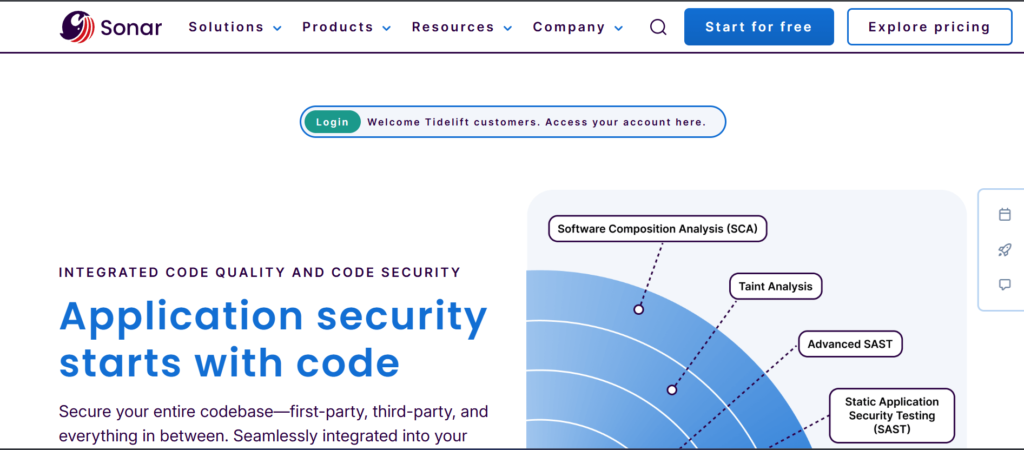
Website: https://tidelift.com
Tidelift offers managed open-source software components that are maintained and validated by project maintainers. It ensures that dependencies used in applications are secure, licensed correctly, and actively maintained. Tidelift partners directly with open-source maintainers, offering a curated supply of packages with long-term support (LTS), patching, and continuous monitoring. It’s designed for teams that want secure open-source usage without the hassle of manual auditing.
Features:
- Maintained and verified open-source packages
- Security updates and CVE patching
- Licensing and legal compliance
- SBOM and dependency reports
- Maintainer-backed long-term support (LTS)
Pricing:
- Free and open-source
Final Thoughts
Supply chain attacks are now among the fastest-growing cybersecurity threats. And in a DevOps-first world, prevention must be embedded into the build, not bolted on after.
These 15 Software Supply Chain Security Tools offer different paths to the same goal: protecting the integrity, authenticity, and security of your software. From free open-source platforms to enterprise-grade solutions, there’s a fit for every workflow.
Start by integrating a few tools into your CI/CD and evolve your security from code to cloud.
FAQs
Q1. What is a software supply chain attack?
A: It’s when a threat actor targets software dependencies or the build pipeline to inject malicious code or disrupt delivery.
Q2. Do I need to generate SBOMs?
A: Yes. Regulatory bodies increasingly require SBOMs (Software Bills of Materials) for transparency and compliance.
Q3. Are there free tools for supply chain security?
A: Yes. Tools like Dependency-Track, Sigstore, and Grype (Anchore) are open-source and free.
Q4. What is SLSA?
A: Supply-chain Levels for Software Artifacts (SLSA) is a framework that defines levels of build and provenance assurance.
Q5. Can these tools integrate with GitHub Actions?
A: Most of them, including Snyk, Phylum, and Slim.AI, offer native GitHub integration.
